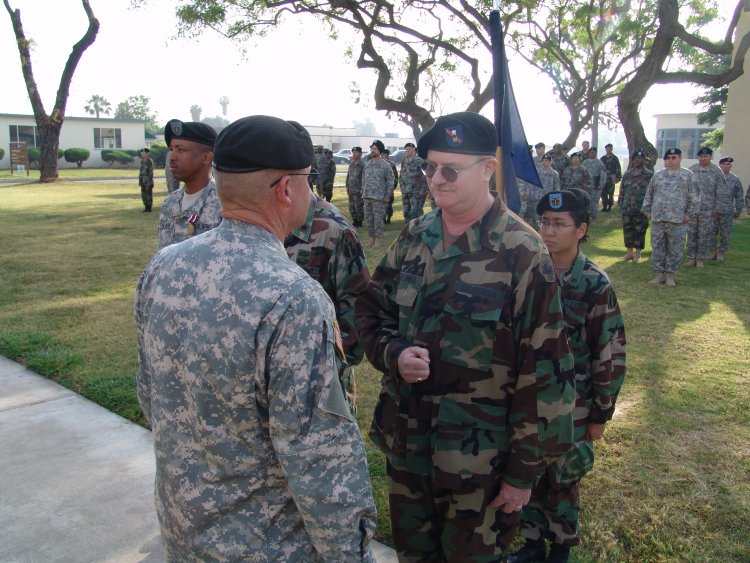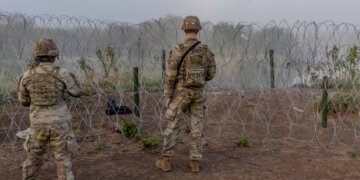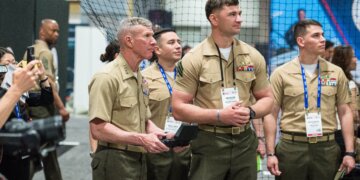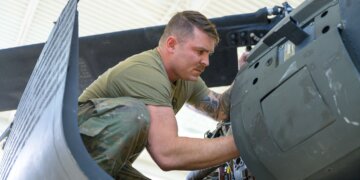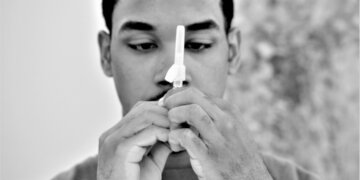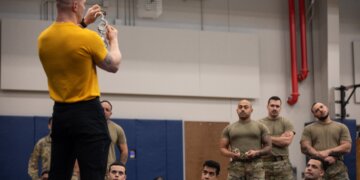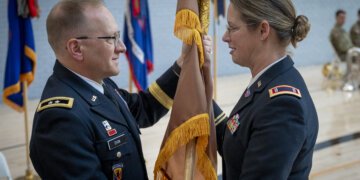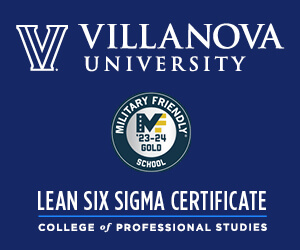Air National Guard Capt. Erik Kallstrom was working as a civilian aircraft mechanic at Boston’s Logan International Airport the morning of Sept. 11, 2001. More than 2,500 miles away, California State Guard Chief Warrant Officer 2 Marc Yablonka was a 50-year-old English-as-a-second-language teacher in the Los Angeles Unified School District.
Kallstrom went to an aircraft that was supposed to be taxiing but wasn’t.
“Don’t worry about this plane,” a man informed him. “We’re grounded.”
American Airlines Flight 11, which was hijacked by al-Qaida and would strike the World Trade Center’s North Tower, had taken off from Kallstrom’s airport. Someone told Yablonka, meanwhile, to turn on the television. He watched the Twin Towers fall, images of fiery debris searing themselves into permanent memory.
What both men witnessed that crisp, late-summer morning changed their life plans forever, each taking the oath of a guardsman. In doing so, they joined more than 181,000 fellow Americans who also enlisted in the military in the year after the 9/11. It was the largest single-year join-up since World War II.
Sacrificial service after 9/11
Kallstrom had previously served as an active-duty airman, leaving the Air Force as a Senior Airman in 2000. Rejoining the military in any capacity wasn’t exactly front-of-mind. But when terrorists killed 2,977 people that Tuesday, he wanted to strike back for freedom.
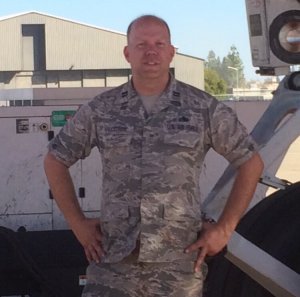
“I just wanted to be part of [the military] again,” he said. “I wanted to actually do something for the country and help out any way I could.”
Kallstrom enlisted in the Air National Guard in 2002, deploying to France, Turkey, Qatar, Afghanistan and Kuwait in the years since.
Yablonka realizes he isn’t a typical “I joined because of 9/11” story. Unlike the younger Kallstrom, Yablonka came of age in the Vietnam draft era, landing a 2-S deferment because he was in college. That fact often gnawed at him as the decades passed.
“Even though I felt a sigh of relief in 1969, I felt inadequate as an American, that I had not served my country,” Yablonka said. “I felt like I needed to do something, but I didn’t know where to go and to whom to turn.”
He became a journalist after university, writing for the Los Angeles Times and Reuters. In 1992, Yablonka began focusing on military journalism and was even able to travel to Vietnam for stories.
But 9/11 pivoted his own story to something new: that of being a public affairs officer (PAO) with the 40th Infantry Division Support Brigade and Installation Support Group, Joint Forces Training Base, in Los Alamitos, California.
Country & calling
A friend who was already serving in the California State Guard (then called the California State Military Reserve) called after Sept. 11 to say that his unit needed a PAO.
“What the hell are you talking about?” Yablonka asked. “I’m 50 years old.”
That’s when he learned that 60 was the cutoff. He said yes, spending eight years covering National Guard and reserve happenings to and from Iraq, Afghanistan, Kosovo and Saudi Arabia.
“That’s how I came to do something for my country, wear a uniform and learn a little bit of the Army way,” said Yablonka, now 72. “I love that I was able to pitch in and give back, I think.”
Kallstrom feels the same, pointing to America’s killing of Osama bin Laden and capturing of other terrorists as positive outcomes in the past 21 years. His service was ― and is ― powered by patriotism, he said.
“My family is a long-time military family,” he explained. “We fought in World War I, II and Vietnam, and I just wanted to be able to do the same ― to serve my country.”
Recently, Kallstrom asked a recruiter at his base in Port Hueneme, California, why most people join the military today, especially considering that some of them were not alive when the terrorist attacks happened. Her reply? For the monetary and educational benefits.
“Is anyone writing down on their applications that they’re enlisting because they want to serve their country?” he asked.
She shook her head. “No one has said that for a while,” she answered.
That bothers Kallstrom. He wants young military members of today to know what it felt like to be an American 21 years ago.
“You saw Democrats and Republicans standing on Capitol Hill, arm-in-arm, singing ‘God Bless America,’” he remembered. “I wish I could show them that kind of America again.”
Read comments


